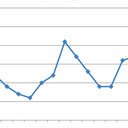Statistics on deliveries of mothers with epilepsy at Yokohama City University Hospital.
الكلمات الدالة
نبذة مختصرة
OBJECTIVE
To survey and summarize the treatment of pregnant women with epilepsy and to obtain data for the improvement of daily treatment regimens.
METHODS
We reviewed medical records of 36 deliveries of 25 mothers with epilepsy at Yokohama City University Hospital from September 1991 to December 2000 and statistically compared the differences in drug-taking profiles, complications during pregnancy, types of delivery, and complications at delivery between the epilepsy group and a control group (656 total deliveries after 22 weeks except for epilepsy cases in 1991 and 1992 at Yokohama City University Hospital).
RESULTS
Of the 25 mothers with epilepsy, three with idiopathic generalized epilepsy, 12 were symptomatic for partial epilepsy. Their mean age at delivery was 29.0 years. The mean age at onset of epilepsy was 13.9 years. Of the 36 pregnancies, 30 (83.3%) cases continued antiepileptic drug (AED) taking throughout the pregnancies; 23 (63.9%) cases received monotherapy. Phenobarbital was the most frequently used drug in monotherapies. Seven (19.4%) cases received polytherapy. Seven (19.4%) patients experienced epileptic seizures during pregnancy. One case showed a low serum AED level. No statistically significant difference was found in complications during pregnancy, types of delivery, or complications at delivery, excluding abnormal rotation in the birth canal. Congenital malformation (cleft lip with palate) was observed in one (2.9%) case. The mother was 39 years old at delivery and had myoma uteri. Onset of epilepsy was at 14 years. She had been taking three kinds of AEDs: 1,400 mg/day of sodium valproate (VPA), 1.5 mg/day of clonazepam (CZP), and 200 mg/day of zonisamide (ZNS). Serum concentrations at pregnancy week 10 were 85.3 microg/ml VPA, 18.1 microg/L CZP, and 10.5 microg/ml ZNS. She also had been taking folic acid, 5 mg/day, but the serum concentration was not measured.
CONCLUSIONS
The method of treatment and the management of pregnancy were left to the discretion of each doctor. However, in most cases, monotherapy was selected; and the frequency of complications was not significantly different from that of the control group, excluding the frequency of abnormal rotation in the birth canal. However, we could have been more proactive in calculating the risks of pregnancy for women with epilepsy and adjusted treatment in anticipation of a planned pregnancy, before the patient actually became pregnant. Additionally, a closer working relationship between the obstetrician and the physician who treats the epilepsy would seem to be a further requirement for the patient's well-being, as well as her child's, during pregnancy.


